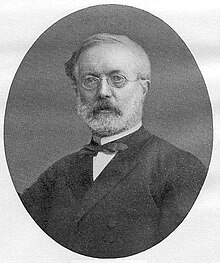Johann August Nauck

Johann August Nauck (18 September 1822 – 3 August 1892) was a German classical scholar and critic. His chief work was the Tragicorum Graecorum Fragmenta (TrGF).
Biography
Nauck was born at Auerstedt in present-day Thuringia. He studied at the University of Halle as a student of Gottfried Bernhardy and Moritz Hermann Eduard Meier. In 1853 he became an adjunct under August Meineke at the Joachimsthal Gymnasium in Berlin. After a brief stint as an educator at the Grauen Kloster (1858), he relocated to St. Petersburg, where in 1869, he was appointed professor of Greek at the historical-philological institute.[1]
Nauck was one of the most distinguished textual critics of his day,[2] although, like PH Peerlkamp, he was fond of altering a text in accordance with what he thought the author must, or ought to, have written.[3] Nauck was elected a foreign member of the Royal Netherlands Academy of Arts and Sciences in 1885.[4]
Published works
The most important of his writings and translations, all of which deal with Greek language and literature (especially the tragedians) are as follows:
- Fragments of Aristophanes of Byzantium (1848).
- Euripidis Tragoediae superstites et deperditarum fragmenta; ex recensione Augusti Nauckii, (1854).[5] (Euripides, tragedies and fragments)
- Tragicorum Graecorum Fragmenta (1856, last edition, 1983), His chief work — it was intended as a counterpart to Meineke's "comedy fragments", ("Fragmenta comicorum graecorum").[2]
- Revised edition of Schneidewin's annotated Sophocles (1856, etc.)
- Porphyrius of Tyre (1860, 2nd ed., 1886); "Porphyrii philosophi Platonici opuscula selecta".
- Lexikon Vindobonense (1867).[6]
- texts of Homer, Odyssey (1874) and Iliad (1877–1879); published as "Homerica carmina" (volume I. Ilias; volume II. Odyssea).[7]
- Iamblichus, De Vita Pythagorica (1884).
References
- This article incorporates text from a publication now in the public domain: Chisholm, Hugh, ed. (1911). "Nauck, Johann August". Encyclopædia Britannica. Vol. 19 (11th ed.). Cambridge University Press. p. 276.
- ^ ADB: Nauck, August @ Allgemeine Deutsche Biographie
- ^ a b Nauck , August @ NDB/ADB Deutsche Biographie
- ^ Statement source: The Encyclopædia britannica: a dictionary of arts, sciences ..., Volume 19 edited by Hugh Chisholm
- ^ "Johann August Nauck (1822 - 1892)". Royal Netherlands Academy of Arts and Sciences. Archived from the original on 5 July 2020.
- ^ Archive.org Euripidis Tragoediae
- ^ WorldCat Identities Most widely held works by August Nauck
- ^ WorldCat Title Homerica carmina
External links
- Tragicorum graecorum fragmenta recensuit Augustus Nauck, Lipsiae sumptibus et typis B. G. Teubneri, 1856.
- Tragicorum graecorum fragmenta recensuit Augustus Nauck, editio secunda, Lipsiae in aedibus B. G. Teubneri, 1889.
Further reading
- Memoir by T Zielinski, in Bursian's Biographisches Jahrbuch (1894), and JE Sandys, History of Classical Scholarship, iii. (1908), pp. 149–152.
